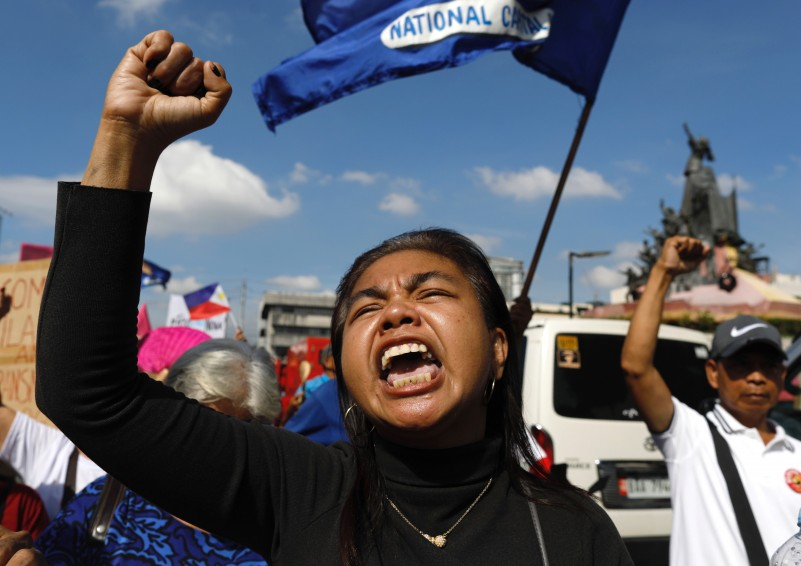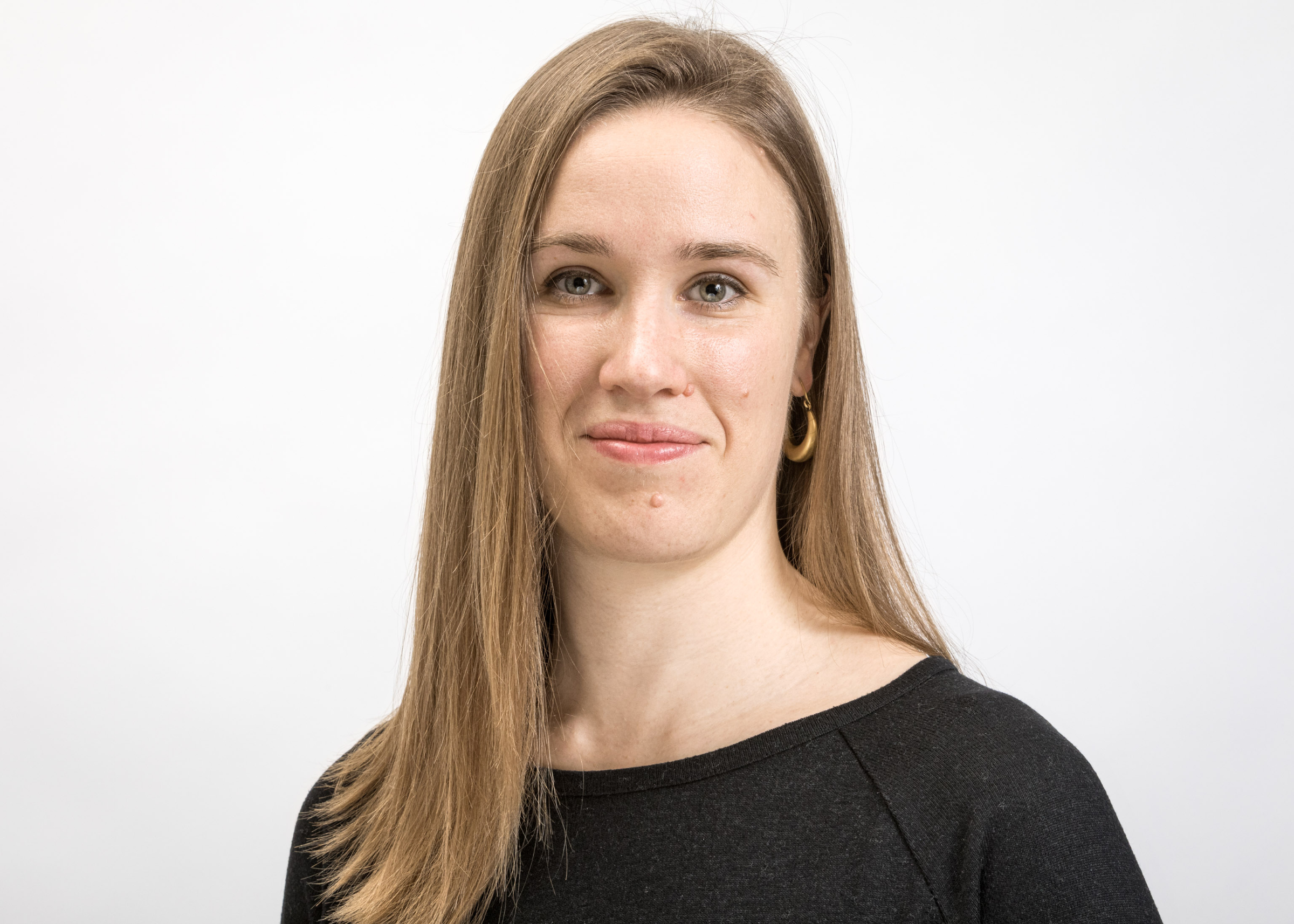Share post now
Article
When women lead the way to peace
14.06.2023, International cooperation
Since the start of the war in Ukraine, European countries have primarily been upgrading the army rather than stepping up solidarity. Feminist voices are calling for a more comprehensive peace policy – including in Switzerland.

Citizens demonstrate for their human rights in front of the People Power Monument in Quezon City, Manila (Philippines) on 25 February 2023.
© Francis R. Malasig / Epa / Keystone
It felt like a first when the German Government unveiled a "Feminist foreign policy" in 2021, attracting extensive media attention. Only few knew at the time that, already in 2014, Sweden had become the world's first country to adopt a feminist foreign policy (which it has since abandoned). In the Global South, Mexico was the first country to attempt to reduce structural inequalities and the gender gap in pursuit of a more just and prosperous society. Meanwhile, some 30 countries around the world have launched feminist foreign policies.
In the context of the war in Ukraine, the discussion has taken on new dynamism and again focused attention mainly on peace and security issues. These were already enshrined in Resolution 1325 "Women, Peace and Security", which was initiated by women from the Global South and unanimously adopted by the UN Security Council in 2000. The resolution and its follow-up resolutions called, among other things, for protection from and prosecution of wartime sexual violence against women and girls, and also the effective inclusion of women in conflict prevention, peace processes and post-conflict and post-war reconstruction. Empirical research also shows that women in fact make a key contribution to peace when they are able to play an active part in the processes.
From gender equality policies to intersectionality
Yet, implementing a feminist foreign policy and more especially a peace policy, has so far proved very difficult in the practice of international cooperation, despite the fact that "gender mainstreaming" has become a buzzword and is sometimes even exploited as a means of "pink-washing". For example, former Director of the Women's Development Fund Theo Sowa has been critical of the fact that in 2020, only about 5 per cent of the bilateral development funding available for distribution to different sectors went towards projects and programmes with gender equality as their principal objective. Existing power structures pose a problem, says Uta Ruppert, Professor of Political Science and Political Sociology at the Goethe University in Frankfurt: "Asymmetrical world relations, which are being constantly created and consolidated anew through world trade and financial policy, resource extraction and raw materials policy, through investment and (agro)industrial policy, cannot be fixed with gender equality policies".
The prism through which the relevant issues are viewed is therefore of particular significance. Recent years have brought an increase in the number of studies, including among Alliance Sud member organisations, that are helping to elucidate the full extent of the multiple discrimination (intersectionality) affecting women and girls in the context of political and economic power structures. This trend is also broadening the view to encompass other marginalised groups (e.g., LGBT) and security-related issues. For example, the umbrella organisation of development and humanitarian non-governmental organisations in Germany, VENRO, asserts that the goal of feminist foreign and development policy must be "to overcome discrimination, conflicts, wars and violence within and between societies and to invest in peace."
And what is Switzerland doing?
So far in Switzerland, only isolated voices and parties have campaigned for a feminist foreign policy. This is so even though much remains to be done by way of implementing the National Action Plan (NAP) under Resolution 1325. Anne-Marie Sancar, Programme Officer at the NGO PeaceWomen Across the Globe, says: "Switzerland must take cross-departmental action and provide sufficient resources for working with local and transnational women's rights organisations and experts over the longer term."
Thanks to the adoption of a 2003 Gender Strategy for the Swiss Agency for Development and Cooperation (SDC), and to the deliberate promotion of women in the diplomatic corps by former Foreign Minister Micheline Calmey-Rey, Swiss foreign policy now embodies greater sensitiveness to gender issues. Efforts are also under way to promote them in the international arena. For example, one Swiss priority in the UN Security Council is the equal participation by women in peace processes and UN peace missions that can tackle the problems in affected countries.
Feminist peace policy and equal participation by women in peace processes, however, is about much more than women sitting at the table, says Sancar. "Feminist peace-building means striving for transformative, structural change. This calls for the commitment of more men who rethink their roles and do not hamper structural changes that favour greater gender justice." As a recent study shows, patriarchy and its social norms compound many conflicts, and cannot be ignored.
Types of feminism in the local context
Swiss civil society is supporting and monitoring implementation of the Swiss NAP, and is making the case for greater use of the NAP 1325 also as a domestic policy tool, and for it to address the all-round security of women in Switzerland. "A reorientation and redefinition of security is needed in this regard," says Sancar. “Feminist foreign policy is also feminist domestic policy, and in that sense implies a comprehensive security policy! Gender-specific violence, unpaid and underpaid care work and also precarious working conditions here at home must be addressed in the same way as the use of gender-specific violence as a weapon of war."
Such a self-critical approach could also help ensure that a Swiss feminist foreign policy would not focus exclusively on foreign countries and the Global South, thereby reinforcing a colonial pattern. Sancar stresses that "Feminist peace policy invariably relies on context-specific approaches that revolve around local people's needs, ideas and solutions." In this connection, the women’s strike in Switzerland on 14 June was a good opportunity to better understand and more strongly support the various types of feminism in civil society and their contribution to peace.


